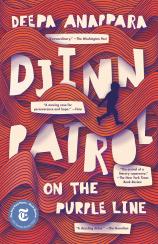Djinn Patrol on the Purple Line
Review
Djinn Patrol on the Purple Line
Nine-year-old Jai is an aspiring detective, even though he didn’t know he wanted to be. And really, he isn’t very good at it. Ask him; he’ll tell you that himself. But he has been thrust into the role of detective because his friend Bahadur went missing from their basti, a community of ramshackle, tin-roofed homes outside of the city --- what some call a blighted slum. The purple line of the Metro runs nearby. But the price of a ticket is beyond Jai’s means. His Ma works for a rich lady, but she is mean and doesn’t pay well. His Papa also works, but making ends meet is almost impossible. And with this emergency cropping up, how will they survive if they have to miss a day of work?
Jai’s skills become even more necessary when additional children disappear. Worse, the police seem annoyed rather than concerned when called upon for help. Jai sees all of this and leaps in to do something --- anything --- when he believes that everyone else is on the wrong track. But at only nine, his investigation is hampered by his Ma and Papa demanding that he stick close to home. It’s frustrating, stuck inside the small one-room house. Jai is not one to disobey, but his friends need rescuing. Their basti is a close-knit one, with members of other families stepping in to watch over the children while the ones who have jobs go off to work. Clever Jai has a knack for sneaking out, though, and meets up with his friends Pari and Faiz to pursue whatever leads they can unearth.
"DJINN PATROL ON THE PURPLE LINE points out some social injustices, but also innocent pleasures. Children really do tell the best tales, just like young Jai here."
Of course, Jai has a theory that djinns may have snatched the children. Pari, being the oldest, scoffs at that. To his dismay, she tends to come up with the most cogent ideas and questions. Still, Jai is learning. Sadly, his young self has some hard lessons in store. But then, life in the basti is not just hard. It’s brutal.
Debut novelist Deepa Anappara’s Jai is a delightful storyteller. He doesn’t make a great detective, but that doesn’t matter. He leads us around the bazaar near his home, sort of the center of everything. It is a place where vendors shoo the kids away. And where a man who employs Jai (it is illegal to hire children) pays him only half of what he promised. And it is a place where evil people lurk. Jai keeps a wary eye out, but, remember, he is only nine years old. The boy lacks experience in a big way, which is part of what gives him a fresh, welcome voice. Plus, he is open to alternative suspects, like djinns. Their community has deep roots in mystic beliefs. Jai revels in their lore. As a child, he can eavesdrop on adult conversations, which is made quite easy in their slum because of the thin walls, if walls exist at all. He absorbs information, and his brain processes it as best it can, then he runs with it.
The mystery of who is snatching these poor children is less the main focus than the lives they have endured. Their station in this world has showered indignities and unfairness upon them. The dismissive attitude of the local police demonstrates the value they place on these people. But those children are the entire universe to their mothers and fathers. Their loss is as huge to them as to the rich men and women in the high towers nearby. However, the attention given their loss isn’t.
DJINN PATROL ON THE PURPLE LINE points out some social injustices, but also innocent pleasures. Children really do tell the best tales, just like young Jai here.
Reviewed by Kate Ayers on February 14, 2020




